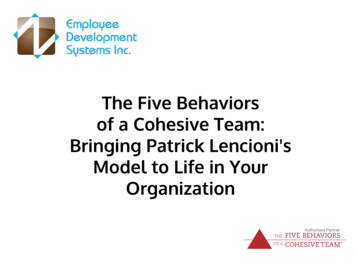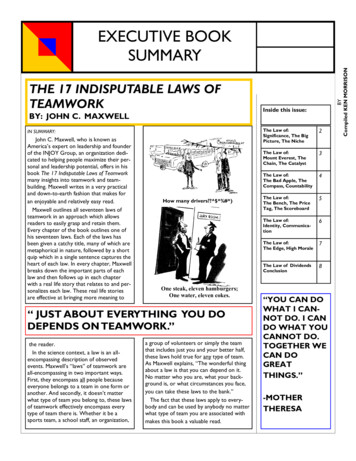
Transcription
Skills to Pay the BillsTeamworkTeamwork is an essential part of workplace success. Like a basketball team working together to set upthe perfect shot, every team member has a specific role to play in accomplishing tasks on the job.Although it may seem as if one player scored the basket, that basket was made possible by manypeople’s planning, coordination, and cooperation to get that player the ball. Employers look for peoplewho not only know how to work well with others, but who understand that not every player on theteam can or will be the one who gets the ball. When everyone in the workplace works together toaccomplish goals, everyone achieves more.Teamwork involves building relationships and working with other people using a number of importantskills and habits: Working cooperatively Contributing to groups with ideas, suggestions, and effort Communication (both giving and receiving)today’s job market. Employers are Sense of responsibilitylooking for workers who can contribute Healthy respect for different opinions, customs, andindividual preferences The ability to work as part of a team isone of the most important skills intheir own ideas, but also want peoplewho can work with others to createand develop projects and plans.Ability to participate in group decision-makingWhen employees work together to accomplish a goal, everyone benefits. Employers might expect to“see” this in action in different ways. For example, team members in the workplace plan ahead andwork cooperatively to assign tasks, assess progress, and deliver on time. They have professionaldiscussions during which differing approaches and opinions might be shared and assessed in a respectfulmanner. Even when certain employees end up with tasks that were not their first choices, jobs get donewith limited complaints because it is in the spirit of teamwork and with the overall goal in mind. Aleader or manager may often serve as the teamwork facilitator. In this case, team members participaterespectfully in discussion, carry out assigned tasks, and defer to the leader in the best interest of thegoal. Consensus is wonderful, but not always possible, and an assigned leader will often support andfacilitate the decision-making necessary for quality teamwork to exist.The activities in this section seek to teach participants about the importance of teamwork to workplacesuccess and the specific role each individual on a team may play. Participants will learn about positiveteamwork behavior and discover how their own conduct can impact others on a team. The section alsodiscusses possible obstacles to teams working successfully and offers the opportunity to buildconstructive strategies for overcoming these challenges.56
Mastering Soft Skills for Workplace SuccessNote to facilitators: Learning the value of teamwork and becoming an effective member of a team isan important first step to developing leadership skills. For disconnected youth, especially those withunderlying disabilities, the development of these skills is critical. Young people without a connectionto work or school typically have had limited exposure to positive and proactive support systems, or atrue sense of the essence of the proactive support of a community. Affording young peopleexperiences through which they learn to rely on themselves and others is an important factor in thedevelopment of a productive teamwork mentality. If working with disconnected youth and/or youthwith disabilities, use these activities to bridge teamwork skills as a stepping-stone to leadershipdevelopment.57
Skills to Pay the Bills11. There is No “I” in TeamJUST THE FACTS: The purpose of this activity is to enrich participants’ understanding of what it meansto be part of a team and why being a good team player is important for career success.Time15-20 minutesMaterials Chart paper or sentence strips with markers and/or Activity 11 printed out for eachparticipantDirectionsChoose and display five “teamwork” quotes (see Activity 11). This can be done on chartpaper, using the accompanying worksheet, writing quotes on sentence strips, or readingeach quote aloud. What is important here is the quote – and not necessarily who said thequote.Ask participants to choose the quote they like best. Divide the larger group into smallergroups according to the chosen quote (i.e., all participants who liked quote #1, etc.).Participants should spend approximately two minutes discussing the quote and coming toconsensus on the reason they liked it the best. One member of each team should beprepared to offer the group’s feedback and reflection.For another, more hands-on version of this activity, write each of the quotes on sentencestrips. Cut the sentence strips into individual words or manageable chunks/phrases. Havegroups work together to arrange the words/phrases into the correct order.ConclusionTell participants that employers rate the ability to be a “team player” as one of the mostimportant qualities and characteristics of their current (and future) employees (i.e., thejob candidate). Ask why this is might be so. Elicit responses and an interactive discussion.Journaling ActivityA friend comes to you seeking advice. He got into trouble at work for not being a teamplayer. He really likes his job and isn’t quite sure what to do. What suggestions wouldyou give to your friend to help him improve? How might he respond to his boss?58
Mastering Soft Skills for Workplace SuccessExtension ActivityHave participants create their own personal quotes about teamwork why it is important what can be accomplished etc. The quote should be one that encourages peers to gain abetter understanding and perspective on the importance of teamwork AND why it is often acore value shared by many different cultures, populations, and groups.Offer the opportunity for participants to research and share proverbs related to teamworkfrom their own cultures.59
Skills to Pay the BillsActivity 11. Teamwork Quotes“Individual commitment to a group effort - that is what makes a team work, a company work, asociety work, a civilization work.” - Vince Lombardi (football coach)“Coming together is a beginning. Keeping together is progress. Working together is success.”- Henry Ford (pioneer of the assembly-line production method)“There is no such thing as a self-made man. You will reach your goals only with the help ofothers.” - George Shinn (former owner of Charlotte, now New Orleans, Hornets basketball team)“It is amazing what can be accomplished when nobody cares about who gets the credit.”- Robert Yates (politician in the 1700s)“Teamwork divides the task and multiplies the success.” - Author Unknown“I am a member of a team, and I rely on the team, I defer to it and sacrifice for it, because theteam, not the individual, is the ultimate champion.” - Mia Hamm (retired American soccer player)“Respect your fellow human being, treat them fairly, disagree with them honestly, enjoy theirfriendship, explore your thoughts about one another candidly, work together for a common goaland help one another achieve it.”- Bill Bradley (American hall of fame basketball player, Rhodes scholar and former three-term Democratic U.S. Senator fromNew Jersey)“Talent wins games, but teamwork and intelligence wins championships.”- Michael Jordan (former American basketball player, businessman and majority owner of the Charlotte Bobcats)“Alone we can do so little; together we can do so much.”- Helen Keller (American author, political activist, lecturer, and the first deafblind person to earn a Bachelor of Arts degree.)“The strength of the team is each individual member.the strength of each member is the team.”- Phil Jackson (widely considered one of the greatest coaches in the history of the NBA)“Unity is strength. when there is teamwork and collaboration, wonderful things can beachieved.” - Mattie Stepanek (advocate on behalf of peace, people with disabilities, and children with life-threateningconditions who died one month before his 14th birthday)“Lots of people want to ride with you in the limo, but what you want is someone who will takethe bus with you when the limo breaks down.”- Oprah Winfrey (American television host, actress, producer, andphilanthropist)“Finding good players is easy. Getting them to play as a team is another story.”(baseball hall of famer)60- Casey Stengel
Mastering Soft Skills for Workplace Success12. I’ll Give You Some of Mine if You Give Me Some of YoursJUST THE FACTS: Part of becoming a functional member of a team is learning to understand what youbring to the group and what you might need from others. This exercise is designed to help participantsbegin to identify their individual strengths and needs regarding teamwork.Time30 minutesMaterials Activity 12 Pens or pencils Optional: Chart paper and markersDirectionsIntroduce this activity by reflecting on some of the quotes discussed in Activity 11 (if youhave not completed Activity 11, choose some of the quotes to discuss with the group – andoffer a brief discussion on their meaning).Ask participants for a list of some of the characteristics they think make up a good teamplayer. This might be phrased as follows: “What does it take from each person on a teamto make a team really work?”Students will be completing an individual inventory of the skills they possess related toteamwork. This inventory is for personal reflection and need not be shared.ConclusionAs part of the concluding activity, ask participants to share one of their identified areas ofstrengths – and one area they would like to improve. This discussion allows each to hearfrom others their areas of strength and need. This process may help those in need ofassistance identify who might be able to offer it.Journaling ActivityConsider your score on the Elements of Teamwork inventory. Were you pleased with yourresults? What are some of the areas you would like to improve? How will you attempt todo this?61
Skills to Pay the BillsExtension ActivityHave participants ask someone they know and trust to rate them using a blank copy ofActivity 12. Were the scores/checks similar or different? What does this tell them? Doesthis change any of the notes made related to skills to improve?Have participants redesign the activity with words and/or actions that better describe theelements of teamwork from their perspective. Another option is for participants toschedule a meeting with an employer and get additional input as to how an employermight identify or describe the characteristics listed.62
Mastering Soft Skills for Workplace SuccessActivity 12. Elements of Teamwork – An Inventory of SkillsPart of being a good team member is learning how to understand your personal strengths (what youhave to offer) AND where you might need to draw assistance from others. Listed on this sheet are 10of the characteristics that make a productive team member. Rate your level of confidence in each skill(HONESTLY) – and then devise a plan for how you can improve some of the areas you think might needa “jump start.”SKILL #1: RELIABLEThis means: You can be counted on to get the job done.Rating:Not so confidentSort of ConfidentReally confidentSKILL #2: EFFECTIVE COMMUNICATORThis means: You express your thoughts and ideas clearly and directly, with respect for others.Rating:Not so confidentSort of ConfidentReally confidentSKILL #3: ACTIVE LISTENERThis means: You listen to and respect different points of view. Others can offer you constructivefeedback – and you don’t get upset or defensive.Rating:Not so confidentSort of ConfidentReally confidentSKILL #4: PARTICIPATESThis means: You are prepared – and get involved in team activities. You are regular contributor.Rating:Not so confidentSort of ConfidentReally confidentSKILL #5: SHARES OPENLY AND WILLINGLYThis means: You are willing to share information, experience, and knowledge with the group.Rating:Not so confidentSort of ConfidentReally confidentSKILL #6: COOPERATIVEThis means: You work with other members of the team to accomplish the job - no matter what.Rating:Not so confidentSort of ConfidentReally confidentSKILL #7: FLEXIBLEThis means: You adapt easily when the team changes direction or you’re asked to try something new.Rating:Not so confidentSort of ConfidentReally confidentSKILL #8: COMMITTEDThis means: You are responsible and dedicated. You always give your best effort!Rating:Not so confidentSort of ConfidentReally confident63
Skills to Pay the BillsSKILL #9: PROBLEM SOLVERThis means: You focus on solutions. You are good about not going out of your way to find fault in others.Rating:Not so confidentSort of ConfidentReally confidentSKILL #10: RESPECTFULThis means: You treat other team members with courtesy and consideration - all of the time.Rating:64Not so confidentSort of ConfidentReally confident
Mastering Soft Skills for Workplace SuccessConsider your answers:Did you have mostly “not so confident” checked off?If so, you are still developing your confidence as a team player. These skills often take some time todevelop – so don’t worry. It might be helpful to reach out to someone you know and trust to help youfocus on developing a plan for working on some of the skills in which you would like to be moreconfident. Don’t be afraid to ask for help. Asking for help when you need it is another great skill of aproductive team player.Did you have mostly “sort of confident” checked off?If so, you are pretty confident in your teamwork skills – but could probably use a little extra support ordevelopment in a few areas. Invite someone close to you (someone you know and trust), to work withyou on the areas you would like to improve. Most people would be really happy to help you! Learningthe strategies to become a good team member takes time, energy, and dedication.Did you have mostly “really confident” checked off?If so, you are truly confident in your ability to be a good team player. That’s great! Figure out an areaor two where you would like to continue to see improvement (since we should always be striving to bethe best we can be) and develop a plan for how to further grow those skills. Also try to offer support tosomeone you know who might be struggling with building his or her own level of teamwork confidence.Now consider your teamwork skills confidence levels:I am most proud of my ability to:I want to improve my ability to:I will reach out to some of these people for guidance:65
Skills to Pay the Bills13. The Good, the Bad, and the ReasonableJUST THE FACTS: Teamwork can be tough. Dealing with different personalities and compromise is notnecessarily easy. So, what do you do when you are part of a team and there are barriers to the team’ssuccess? This could be a sports team, a team at work, or a group working on a school or communityproject. The purpose of this activity is to engage participants in a discussion of some of the barriers toeffective teamwork and the strategies they may be able to put in place to create positive outcomes.Time25 minutesMaterials Flip chart and markers Dry spaghetti and marshmallows Optional: TimerDirectionsAsk participants if teamwork is ALWAYS easy. (Most likely you will receive “no” answers).Delve deeper and ask about some of the reasons why teams sometimes don’t work or whatmakes teamwork so difficult at times. Write these answers on the flip chart. Answers mayinclude: inconsistent team players, time issues, compatibility, differences incommunication styles (both giving and receiving), lack of trust, no clear goal, etc.Next, divide participants into groups of four or more. Ask each group to elect a teamleader for this activity. Give each group a supply of spaghetti and marshmallows. Tell thegroup they will have 15 minutes to work together to create the tallest freestandingstructure possible. Before you say, “go,” tell the teams that their team leaders may onlysupervise and offer instructions. He or she may not physically participate in this activity.ConclusionAfter 15 minutes, evaluate the structures. Usually the highest structure has a solid andwide foundation. Discuss with participants what it means to have a solid foundation – andwhy laying a solid foundation is important (and the core of an effective team).66
Mastering Soft Skills for Workplace SuccessUse the following questions for additional discussion:1. How did your team work together? What specifically worked well? What difficulties didyou experience?2. Besides the team leader, what role did each person play in the group? How was eachperson helpful to the end goal?3. Was it a plus or a minus that the team leader was not able to physically participate inthe activity? How did the team leader feel about his or her level of participation?4. What would you do differently if given a second chance at this activity?Journaling ActivityYou are the leader of a team at work. What type of leader would you like to be – one thatgets involved and works with the team or one that tells the team what to do? Explain yourchoice.Extension ActivityHave participants interview no fewer than 20 of their peers and ask two simplequestions:1. What is the best part of working on a team?2. What is the most difficult part of working on a team?Participants should be instructed to bring their results back to the larger group. The largergroup should then examine the most common difficulties described and come up withsolutions to turn these difficulties into successes.67
Skills to Pay the Bills14. How Many Shapes Does it Take?JUST THE FACTS: It takes all types of team members to create a balanced, cohesive team. Thisactivity will give participants the opportunity to gain a better understanding of the roles differentpeople play on a team and the importance of each role.Time20 minutesMaterials Five large pieces of paper, each with one of the following shapes drawn: square,rectangle, circle, triangle, and squiggleDirectionsBefore beginning this activity, place each of the five shapes in a different location in of theroom. Ensure there is enough room for participants to move around for this activity.Discuss the fact that teams are all made up of people who perform different roles. Thinkabout a sports team (football, basketball, soccer, hockey, etc.). What might happen if onebasketball player hogged the ball all of the time? What might happen if the quarterbacktried to run the ball all of the time instead of passing? So, it takes all different types ofplayers to make an efficient and winning team, right?Now, switch gears. Tell participants that not only does it take all different types of playersto make a team effective; it takes all kinds of shapes, too.Say something to the effect of: “I want you all to look around the room. Five differentshapes are hanging up. The shapes are a square, a rectangle, a circle, a triangle, and asquiggle. What if I told you that knowing whether you, your co-workers and friends aresquares, rectangles, circles, triangles, or squiggles could help you build better teams andbetter careers?”Ask participants to stand up and take a few moments to think about the shape they likebest or find most appealing. Then ask participants to walk over to that shape.Once everyone has chosen their personal shape, use the information in Activity 14 to tellthem a little bit about each shape’s “personality.” In fact, when you are finished with thisactivity, many participants will want to have a copy of what the shapes mean.68
Mastering Soft Skills for Workplace SuccessConclusionDiscuss the following questions with the group: Do you think people have the characteristics of more than one shape? Why do you think it is important to have all different shapes working on the sameteam? Offer some of the information below, if appropriate:-The Square, Rectangle, and Triangle are all convergent. This mean they areworking TOWARDS something specific and finite, and they do it in a logical andsystematic way. But they might be lacking in personal creativity.-The Circle and Squiggle are divergent. This mean they are creative,extroverted, and intuitive. They will reach out around them into new areas andto other people. But they aren’t particularly systematic or dependable.Journaling ActivityDo you think it is easy or difficult for different types of personalities to work together?Why is it important to not only understand how you work best, but to learn how otherswork best?Extension ActivitySpend some time with participants to explore different types of personality assessments forthe purpose of team building. Have students take different assessments and determine thevalidity of each. Research further and find out which occupations are best suited for whichtypes of personalities.Another option is to have participants think about and describe their favorite sport andcompare players on those teams with the different roles found in the workplace. Examplesmight include: boss – coach; customer – fan; player – co-worker; etc. See how manydifferent types of comparisons can be made and how important it is for all of these roles towork together in order to create harmony on a team.69
Skills to Pay the BillsActivity 14. Which Shape are You?There are some people who believe there are five basic personality types, and each type tends toprefer a different shape. Knowing whether you, your co-workers and friends are squares, rectangles,circles, triangles, or squiggles just might help you build better careers, teams, and friendships. Here iswhat each shape might say about you – and how you can recognize other people for their shapes.If you are a SQUARE: You are an organized, logical, and hardworking person who likes structure andrules. But sometimes you have trouble making decisions because you always want more information.You feel most comfortable in a stable environment with clear directions on what to do. You tend to likethings that are regular and orderly. You will work on a task until it is finished, no matter what.How to spot a square: They appear to move “straight,” use precise or specific gestures, love routine, and arevery concerned with detail. They are also very neat in their appearance and their personal workspace. They do alot of planning and are always prompt.If you are a RECTANGLE: You are a courageous (brave), exciting, and inquisitive explorer who alwayssearches for ways to grow and change. You enjoy trying things you’ve never done before and loveasking questions that have never been asked. You like structure, and will often be the person to besure things are done the proper way, taking all rules and regulations into consideration. When you aregiven a task you will start organizing it to be sure it can be done in the most systematic way.How to spot a rectangle: These people often have “fleeting eyes and flushed faces.” They also tend to giggle andthey like variety. For example, they’ll come into work early or late — but not on time. And those who have officestend to be disorganized with a mishmash of furniture.If you are a TRIANGLE: You are a born leader who’s competitive, confident, and can make decisions.You also like recognition. You are goal oriented and enjoy planning something out and then doing it(you are motivated by the accomplishment). You will tend to look at big long-term issues, but mightforget the details. When given a task you set a goal and work on a plan for it. American business hastraditionally been run by triangles and, although usually men, more women are taking those rolestoday.How to spot a triangle: They have powerful voices, love to tell jokes, and they play as hard as they work. Theyalso tend to be stylish dressers.If you are a CIRCLE: You are social and communicative. There are no hard edges about you. Youhandle things by talking about them and smoothing things out with everybody. Communication is yourfirst priority. When given a task, you will want to talk about it. You are a “people person,” with lots ofsympathy and consideration for others. You listen and communicate well and are very perceptive aboutother people’s feelings. You like harmony and hate making unpopular decisions.70
Mastering Soft Skills for Workplace SuccessHow to spot a circle: They are friendly, nurturing, persuasive, and generous. They tend to be relaxed and smile alot. They’re talkative, but have a mellow voice. They also have a full laugh and like to touch others on theshoulder and arm.If you are a SQUIGGLE: You are “off-the-wall” and creative. You like doing new and different thingsmost of the time and get bored with regularity. When given a task, you will come up with bright ideasabout to do it. But you don’t think in a deliberate pattern from A to B to C. Instead, you tend to jumparound in your mind, going from A to M to X.How to spot a squiggle: They can be “flashy,” dramatic, and extremely creative – and they don’t like highlystructured environments. Both men and women squiggles tend to be funny and very expressive. They also havegreat intuition. Most performers and writers are squiggles.71
Skills to Pay the Bills15. Teamwork on the JobJUST THE FACTS: The purpose of this activity is to help participants understand how teamwork ismanaged on the job – both from the perspective of the boss and from the perspective of the employee.Time15 - 30 minutesMaterials Copies of Activity 15a or 15b, depending on your time frameDirectionsThis exercise offers two different activities. You may choose one or both, depending ontime. One is scenario based and one is a role play.Activity 15a: For this activity, read (aloud or independently) the library scenario. Discussas a group what Shawn (the librarian) did well, and what she could have done differently.How might she handle herself in the future? Discuss how Nathaniel (the boss) shouldhandle this situation. Consider the fact that he probably wants to help Shawn to improveand not necessarily punish her.Activity 15b: For this activity, request volunteers to act out a role play. Allow a fewminutes for the actors to read through the scene so they know what their character is like.After the scene is read aloud, ask the following questions: What was the real problem at the coffee shop? What could Jarrod and/or Steffy have done differently? Do you agree with how the manager handled the situation? What might you have done in this situation?ConclusionThe importance of teamwork is undeniable. Ask the group to come up with a list of thebenefits of teamwork and to illustrate or give examples of each. If the group has troublecoming up with a list, use the following as conversation starters: Support - Teamwork leads to camaraderie between team members. This will not onlylead to better social relationships, but can also act as a support when things go wrong. Varied skills – Different team members bring with them different skills. Distribution of work - Distributing work not only reduces each individual’s burden, butalso increases responsibility and ensures better commitment to completing the taskindividually and as a whole.72
Mastering Soft Skills for Workplace Success Creativity - Different people have different skills and possess different perspectives.Therefore any activity that involves teamwork benefits from the various creativethoughts and inspirations of different people. Accomplish faster – People working together will tend to complete a project fasterthan if one person was working alone.Journaling ActivityThink about a time when you were part of a group/team and things worked really well, anda time when things didn’t work out so well. What were the situations and what made thedifferences?Extension ActivityConsider different jobs in your community. Arrange for field trips to some local job siteswhere participants can ask both managers and employees a few questions about teamwork(or ask an employer and employees to come in to talk about the impact of teamwork onthe job). Alternatively, participants can do this independently and then share theirexperiences with the larger group.Work with participants to develop a single set of questions to ask of managers andemployees. Questions should be focused on the importance of teamwork and whathappens when one or more chooses not to be a team player.73
Skills to Pay the BillsActivity 15A. Teamwork on the JobSCENARIO:Shawn works in a library. She and three other co-workers have been tasked to work together on aproject. Shawn turns in the completed product, but she completed it without input or help from theothers. Shawn said it was really tough to find time to meet together. She did text the others (askingabout working together), but got no responses. Her supervisor, Nathaniel, knows that she is a promisingyoung librarian who wants to advance to a leadership position. Nathaniel also believes that Shawn hasthe potential to be a good leader, but feels she is impatient when it comes to working with others.DISCUSSION: What did Shawn do well? What could she have done differently? How might she handle herself in the future? How should Nathaniel handle this situation? Consider the fact that he probably wants to help Shawn to improve and not necessarily punish her.74
Mastering Soft Skills for Workplace SuccessActivity 15a. Teamwork on the JobNarrator: Five characters will role play a situation to determine whose job it is to restock thecondiments at the coffee arrod: It wasn’t my job! It was Steffy’s job! The policy around here is that the new employeerestocks cream and sugar station. She’s the newest employee. It’s her job!Steffy: I don’t get to work until 10:00. By the time I get here, the station should already be stocked.Otherwise, customers won’t have the stuff they need for their coffee.Pam: You’re just trying to get out of doing your job.Steffy: No! Jarrod gets here at 7:00. He should already have it done by the time I get here.Jarrod: You’re the newest employee.Steffy: What’s your problem?Jarrod: What’s your
Skills to Pay the Bills 56 Teamwork Teamwork is an essential part of workplace success. Like a basketball team working together to set up the perfect shot, every team member has a










